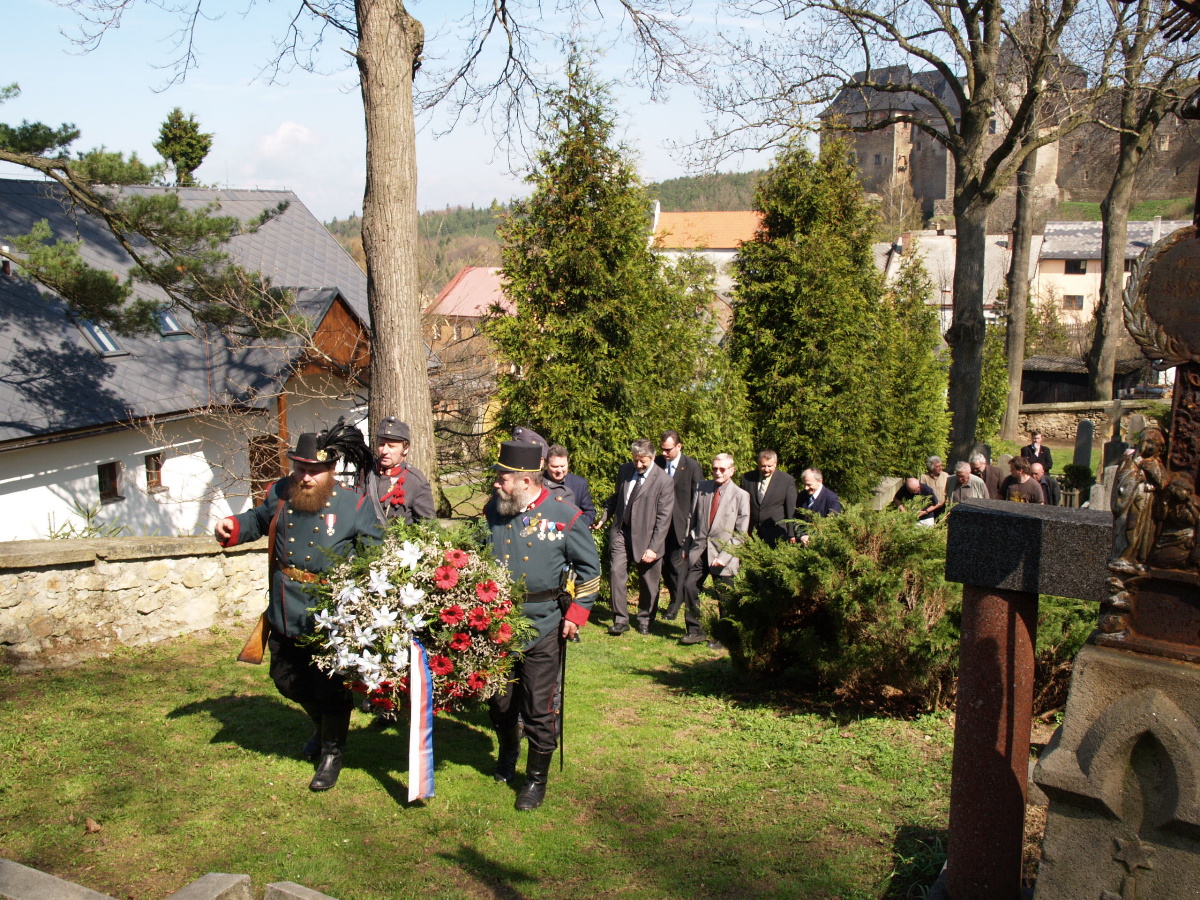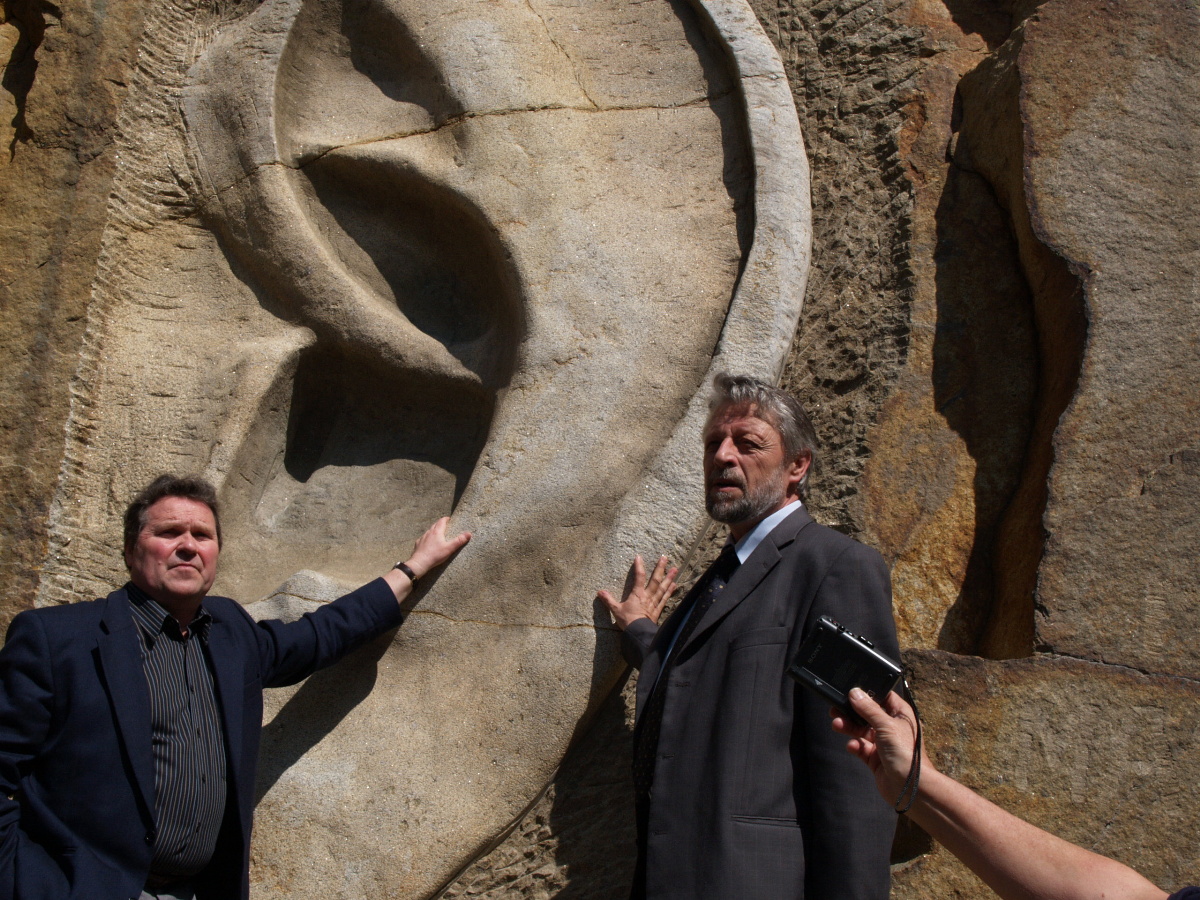|
Society for
Rejuvenating Immortality of Jaroslav Hašek
(Czech original: Spolek
pro oživení nesmrtelnosti Jaroslava Haška)
Report on the Workshop held on Monday, April 24, 2006 in Lipnice on the
Sázava River
|
|

|
|
Photo & Text © Jan Kliment
|
|
The Czech Crown
Inn
saw the arrival of members and
guests of the Society for Rejuvenating Immortality of Jaroslav Hašek. The
participants - including Czech Interior Minister František
Bublan (third
from the left) - of the first public gathering in history organized for
the stated purpose were welcomed by the writer's grandson, Richard Hašek
(standing). He said that not only is the Inn a hallowed place where his
grandfather Jaroslav Hašek created the largest portion of The Fateful
Adventures of The Good Soldier Švejk, but the town of Lipnice itself is
gradually being enriched by artifacts reminiscent of some of the novel's
characters: e.g. chef Jurajda's Hors D'oeuvre, standing in
the town square, but also the so-called Bretschneider's
Ear, another piece
of work by Radomír Dvořák and his pupils from the stone-masonry
apprenticeship school, is - figuratively speaking - an important means of
listening to the 58 languages into which Švejk has been
translated. After
all, the goal of the workshop was a discussion of how to most effectively
help to have the author of Švejk be accepted in his homeland as much as
he is accepted in other countries with which we have almost nothing in
common. "If we want to judge Hašek without prejudice, we have to do
it above all through the significance of his work", said the Chairman
of the Society for Rejuvenating Immortality of Jaroslav Hašek, a well-known film director Antonín Kachlík.
|
|

|
|
Photo & Text © Jan Kliment
|
|
The
overarching theme of the proceedings were preparations for “Hašek-kind“
of year 2008 which will mark the important 125th anniversary of the
birthday and 85 years since the passing of Jaroslav Hašek. That is why the groundwork for an international symposium dedicated to the historical
and cultural environs of Hašek’s life and work is underway in all
seriousness at this time already. Inspiration is being provided not only
by the changing views of political attributes, but also newly discovered
archival materials that make it easier to make sense of the aspects of
World War I and the demise of Austria-Hungary, and also the standing of
the Czechoslovak Legions and ethnic and expatriates’ organizations. No
less important is the programmatic intent to install in Lipnice Josef
Malejovský’s statue of Jaroslav Hašek that is a property of the
Capital City Prague, which can be transferred free-of-charge to the town
of Lipnice. In collaboration with Czech Railways, the preparations of
historic train run along Švejk’s wartime anabasis are almost complete.
Aboard the train will be even a multi-lingual, comprehensive, mobile
exhibit devoted to Hašek, his era and work, which can be installed in Czech
Centers of the Foreign Ministry. There are other remarkable
initiatives underway to foster rejuvenation of immortality of Jaroslav Hašek.
The gathering included also an informal commemoration of this year’s
123rd anniversary of Hašek’s birthday that included laying of wreaths
and flowers at his grave in the Old Lipnice Cemetery. (See the photo
above.)
|
|

|
|
Photo & Text © Jan Kliment
|
|
The workshop
ended with a hike to the aforementioned Bretschneider's
Ear - National Memorial of Eavesdropping And Wiretapping,
anatomically correct sculpture hewn in a granite wall of a former
apprentice quarry. It was there where the Interior Minister, František
Bublan (right) told the Brixen Press Club, among other things: "I
have laid flowers on the grave of Jaroslav Hašek with great respect,
because I greatly esteem his literary heritage and human values. I regret
when Hašek is being mentioned in context of politics in consequence of
which simplified ideological opinions and attitudes are being accentuated.
Jaroslav Hašek was a bohemian and wanderer, but he was not occupied with
politics. He got to see large part of Europe, even the Balkans, and used
the experiences from his journeys in his stories. And above all, he was
not seeing the life around himself through the prism of ideology, but
through the eyes of a common man and that is why his literary heritage is
still alive. The reason Hašek's main work, The Fateful Adventures of
The Good Soldier Švejk has been translated into dozens of languages
is that it is of the life of ordinary people, speaks of their cares and
desires. And I believe that even Czech society will manage to grasp Hašek's
heritage in such a way that it will speak to us more intensely and
contribute to making the world, and our lives as well, better."
|
|